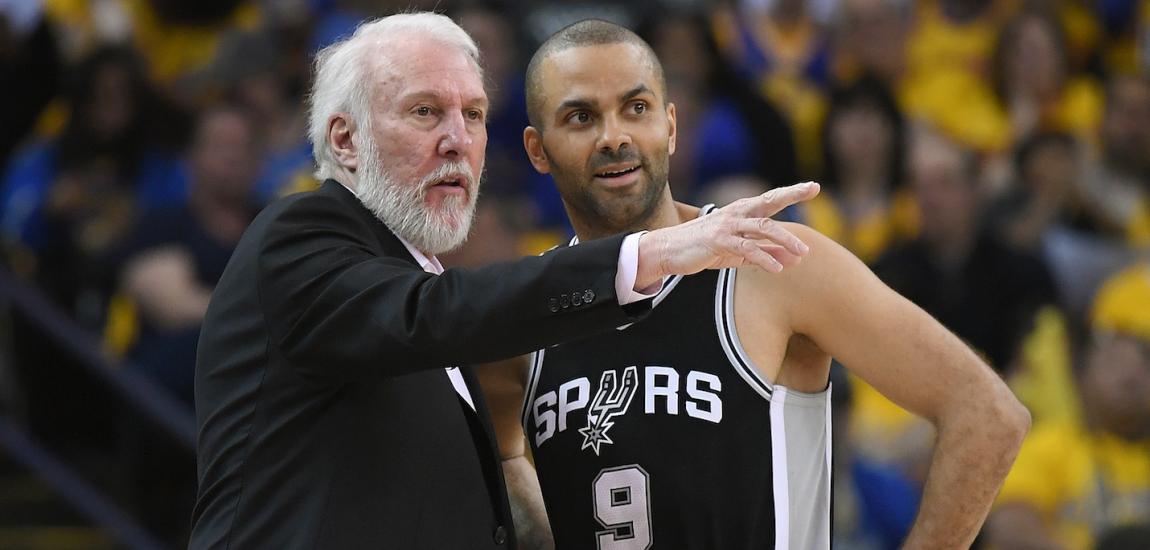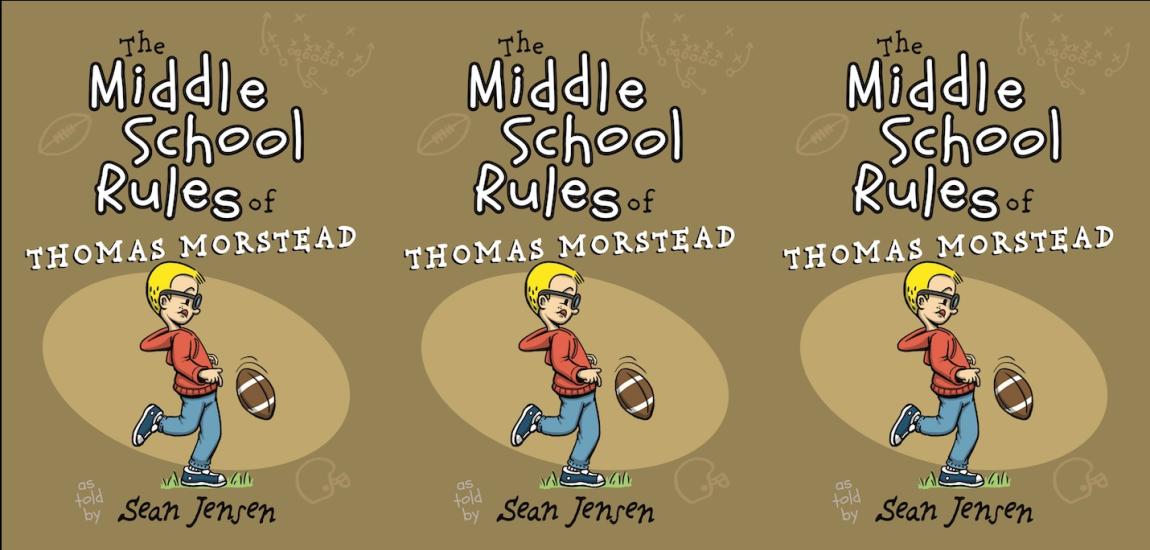Is the SEC really the best conference in college football "top to bottom," as it's so often described? And if it is, why since the start of the BCS era in 1998 does the conference have overall losing records against the Pac-12 (11-12) and Big East (19-23) and superior but not dominating records against other major conferences? Might the nationwide perception of SEC superiority simply be part of a well-constructed ESPN business plan meant to protect and enhance the network’s $2.25 billion partnership with the SEC? As part of his admittedly left-coast-leaning inspection of myths and misconceptions about the South, author Chuck Thompson dug out the numbers and facts in devoting an entire chapter to Southern football amid critiques of religion, politics, education and racism in his new book Better Off Without 'Em: A Northern Manifesto for Southern Secession (Simon & Schuster). Here's an excerpt:
In his seminal work, The Burden of Southern History, historian C. Vann Woodward wrote: "The South has had its full share of illusions, fantasies, and pretensions, and it has continued to cling to some of them with an astonishing tenacity that defies explanation."
Few enduring southern delusions do more to illustrate Woodward's point than the region's storied devotion to college football and the myth of the superiority of the SEC, the twelve teams collectively regarded in the South -- and much of the rest of the country -- as whales to krill, The Beatles to Herman's Hermits, jackhammer sex with Mila Kunis to dry humping your junior prom date standing up in her parents' garage.
Claims to SEC superiority are based on a simple set of arguments, foremost of which is that of the 14 national championships awarded since the 1998 advent of the BCS system, eight have gone to teams from the SEC, including, remarkably, the last six in a row.
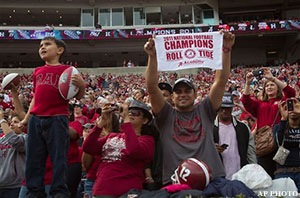
Yet SEC dominance is a very recent phenomenon.
Since the inception of the BCS, the SEC has been crowned national champion 57.14 percent of the time. That's a stunning turnaround when compared with an undisputed national title rate of 10.42 percent over the half-century prior.
So what's behind such a radical shift in fortune, such a statistical improbability?
It certainly isn't on-field performance. Judging by inter-conference records -- that is to say actual games as opposed to media guesswork and bestowed rankings -- the SEC plays other BCS conferences about equally. Witness the record since the start of the BCS era in 1998:
The record is clear. In head-to-head match-ups against other major conferences, the SEC has either a combined losing record or one that's generally only a little better than even.
To SEC apologists who claim that the SEC's overall winning records in bowl games is evidence of success in "games that matter" against "quality opponents," I offer the counter-argument that because bowl game pairings are more easily manipulated than regular-season games, and because SEC teams frequently play in bowls near home stadiums, they often result in more favorable match-ups for SEC teams.
This tilt renders postseason play a less valid measure of strength than the more random sampling of results produced by regular season games.

In 2012, for instance, the SEC was able to even its BCS bowl record against the Big Ten at 19-19 when the Florida Gators beat Ohio State in the none-too-partisan Gator Bowl. The game was played in Jacksonville. No bowl games are played in Ohio.
So, if the SEC plays other conferences about even, why do SEC teams keep winning national championships?
That answer, of course, is the BCS and its corporate underwriters, who have created a reliable business model for determining national champions that is in all respects a self-fulfilling prophecy designed to protect its primary investment.
The BCS business plan works like this: preseason rankings typically include two, three, or four SEC teams among the nation's top ten, more than from any other conference. From the outset, this bias for SEC teams builds into the system a near insurmountable advantage.
Start the season with two of the top four teams being from the SEC, as was the case in 2010 with Alabama and Florida, and in 2011 with Alabama and LSU, and the conference is virtually guaranteed to be represented in the title game -- and this is an important point -- even if neither of those two schools end up winning the conference.
To be the best, so goes to the old sports adage, you've got to beat the best. But since only SEC teams are consistently declared the best, only SEC teams get the chance to prove themselves against "the best."
It's a chicken-or-the-egg situation. Does the SEC get favorable rankings because it's so good? Or is the SEC so good because it gets favorable rankings? I argue for the latter.

In 2010, for example, the Auburn Tigers began the season with a consensus ranking of #23, behind SEC rivals Alabama, Arkansas, Florida, and Georgia. The only way a team regarded so lightly early in the season can possibly climb into the national championship game -- which Auburn did that year -- is to beat a slew of highly ranked opponents, which Auburn also did that year. Because polls are arranged from the outset so that SEC teams will face the most highly ranked opponents over the course of a season, only teams from the SEC are time and again able to manage this feat.
Consider again that the BCS was created by then-SEC commissioner Roy Kramer, also known as the "godfather of the BCS," a man who "attached plastic explosives to college football" and blew it up, according to an ESPN web post. ESPN, of course, is the commercial entity that dominates the college football landscape, and which has a near incalculable economic interest in promoting the nationwide perception of the SEC's elite status.
Actually, you can calculate that interest.
In 2008, ESPN and the SEC signed that a 15-year, $2.25 billion agreement allowing the network to televise the conference's games. In addition, ESPN owns the rights to televise all BCS games, including the national championship game.
In 2011-2012, ESPN and its partner ABC broadcast thirty-three of the thirty-five college bowl games. Which is to say that for all intents and purposes ESPN, a subsidiary of the Walt Disney Company, the most successful spinner of dreams and fables in world history, owns college football as a commercial entity.

Because ESPN essentially owns college football, the SEC agenda it pushes invariably sets the tone followed by other media. In February 2011, more than half a year before the start of the football season, ESPN placed three southern teams in its top-five ranking for 2011 and published an Internet story beneath the headline, "SEC teams dominate early look at 2011." The story referred to the rankings as though they were the result of some organic process.
A more honest headline would have been: "We've invested $2.25 billion in the SEC and we've decided to tell you, yet again, that SEC teams will dominate college football. Surprised?"
This is also why in June, as soon as SEC presidents and athletic directors announced their support of a four-team playoff -- so long as that four-team playoff might include the theoretical possibility that all four teams would come from the SEC, rather than from an equal dispersal of conference champions -- ESPN's flagship opinion show Pardon the Interruption instantly sanctified the decree by stating, "I'm in agreement this time with the SEC" (co-host Michael Wilbon) and, "I'm in agreement, too ... because as you know it's all about the Benjamins." (Fill-in co-host Jackie MacMullan.)
Here's how the self-fulfilling BCS prophecy breaks down in the SEC's favor over the course of a season.
The preseason top twenty-five is stocked with the usual high-profile teams from across the country -- teams, not coincidentally, already scheduled for heavy broadcast exposure. Thanks to its gaudy TV contracts, many of these ranked teams come from the SEC.
Once the season is underway, if a highly ranked SEC team beats another highly ranked SEC team, the winner rises higher in the polls than it might normally, based on the fact that it's just beaten a "top-tier" team from the country's "elite" conference. By the same coin, the losing SEC team in this scenario doesn't drop as far as it might otherwise, since, after all, it has lost to a presumably powerful "top-tier" team from the country's "elite" conference.
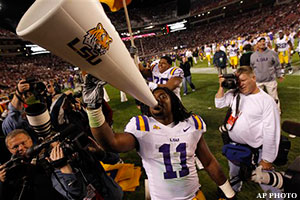
When "good" SEC teams suffer losses in league play, this allegedly proves how tough the SEC is from top to bottom. If an SEC leader wins all of its league games, this allegedly proves how great that team is, given that it somehow managed to go undefeated against a monster SEC schedule -- ignored is the fact that SEC teams have pulled off this putative miracle for the last four straight seasons.
For God's sake, it's tougher to go undefeated in the Colonial Athletic Association than it is in the SEC.
If the same things happen in other conferences, however, the collective football media reverse the logic, claiming that if, say, a Mountain West Conference league leader loses to a lower-ranked Mountain West team, this merely proves how bad that losing team is, not how good the Mountain West is. In the same way, if a league leader goes undefeated in the Mountain West, the feat is said to merely demonstrate how weak the conference is, not accepted as proof of the strength of the unbeaten team.
Though its teams are rarely given the opportunity, the Mountain West, not the SEC, has the highest winning percentage of any conference in BCS bowl games (.750), even though its teams travel further to play in BCS games than just about any others and with fewer supporting fans.
The double standard also allows non-conference victories rolled up by "champions" such as the 2009 Alabama Crimson Tide against the likes of Florida International, North Texas, and Tennessee-Chattanooga to be regarded as evidence of gridiron distinction by those inside the solipsistic cocoon of the self-congratulatory SEC echo chamber.
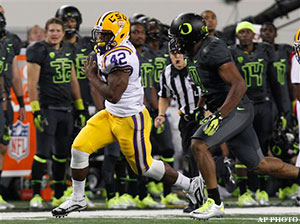
As though empirical evidence is akin to fossil records and climate change data, it's as if no one in the evangelical South is capable of copping to the evidence at hand. In the 2010-11 bowl season, for instance, the SEC posted a .500 record (5-5), same as the then Pac-10 and MAC, slightly worse than the Big East (4-2), and slightly better than the ACC (4-5). Those results moved the wonks at statistical aggregator SportsRatings to report, "In the end, no conference really dominated the bowl season, with most leagues overperforming [Big Ten] or underperforming [SEC] only marginally against expectations."
Despite this underwhelming performance, however, the 2011 preseason table was set up once again to facilitate an SEC title run based on an utterly manufactured and bogus perception of strength.
The chicanery is only getting worse. The most bald-faced example of poll rigging occurred in 2011 when the Pac-12's then number-three-ranked Oregon Ducks lost a September game in Dallas to then number-four-ranked LSU by a score of 40-27. Following the defeat, the Ducks dropped 10 spaces in the polls, to number 13.
With the demotion, Oregon's championship hopes were essentially obliterated from the first week of the season.
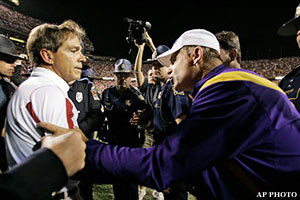
Fine. This is the way it goes in a college football's "every game counts" season.
When the SEC's then #2 Alabama Crimson Tide lost at home to #1 LSU in November, however, it dropped only one space in the polls, to number three.
I was in the stadium for that 2011 alleged "game of the century" between LSU and Alabama, traveling to Tuscaloosa and paying out the ass for a scalped ticket because I was eager to see how mighty legends of the SEC take care of business at home.
It turned out to be a tough night for Alabama fans. The home team eked out only two field goals while converting on just three of eleven third-down opportunities and passing for a Pee Wee football-style 91 yards on nine total completions.
While LSU fans celebrated their 9-6 win in The Houndstooth Sports Bar after the game, I watched as pundits on ESPN went right to work setting up expectations of an LSU-Alabama title game rematch, virtually ignoring the Tide's dismal performance. The original "E" in ESPN stood for "entertainment," after all. Sports have always been a secondary concern.
Within two weeks, just-beaten Alabama had been scooted back up to number two behind top-ranked LSU, and yet another SEC team (Arkansas) had been quickly installed at number three, thus ensuring that no matter what happened next, the SEC would be guaranteed a national title. The system of propaganda reached its torrid, circle-jerk climax with the 2012 BCS title game between LSU and Alabama.

Computer programmers have a term for formulas that rely on flawed or biased original data: GIGO. Garbage in, garbage out. Relying as it does on a garbage premise from the get-go, the entire BCS formula is incapable of producing anything other than garbage results. This will become even more true, not less so, with the additional variables introduced by a four-team playoff.
My overall argument here is not that the SEC sucks. Clearly, it does not.
My argument is simply that if you look at results on the field -- not guesswork from writers, network suits, and BCS computers -- teams from the major conferences, and some schools from smaller conferences, are actually a lot more evenly matched than most fans believe.
Despite being approximately equal to other conferences in most quantifiable categories, the SEC and other southern schools are unfairly presented with championship opportunities and favors on what is far from a level playing field.
The SEC is better than other conferences at media manipulation and pretending that fiction is fact and fact is fiction. But as a top-to-bottom conference it is not better at football. The numbers bear that out.
-- Adapted by permission from Better Off Without 'Em by Chuck Thompson. Copyright (c) 2012 by Chuck Thompson. Published by Simon & Schuster, Inc.. All rights reserved. No part of this excerpt may be reproduced or reprinted without permission in writing from the publisher.
-- Chuck Thompson is the author of five books and a former features editor with Maxim. His writing has appeared in numerous places, including Outside, Esquire, Men's Journal and the Los Angeles Times. He's currently the executive editor of CNNGo.com.








